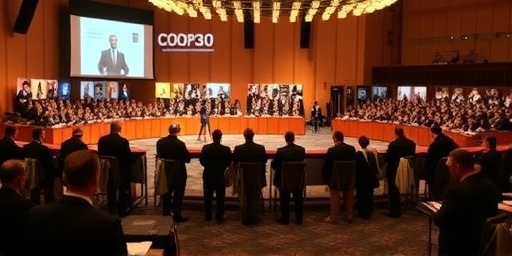In a marathon session that stretched into the early hours, delegates from nearly 200 nations at the COP30 climate conference in Belém, Brazil, hammered out a landmark climate agreement on Friday. However, the deal’s omission of a concrete roadmap for phasing out fossil fuels has left environmental advocates and economic experts reeling, labeling it a missed opportunity amid escalating climate crises.
- Belém’s High-Stakes Talks Push Boundaries on Climate Finance
- Fossil Fuel Lobby’s Influence Shadows COP30 Outcomes
- Economic Ripples: How the Climate Agreement Affects Global Markets
- Voices from the Frontlines: Reactions from Vulnerable Nations
- Charting the Path Forward: Renewed Momentum for Climate Ambition
The agreement, finalized after two weeks of intense negotiations amid sweltering Amazon heat, commits countries to enhanced emissions reductions and increased funding for vulnerable nations. Yet, the absence of binding targets to transition away from coal, oil, and gas—the primary drivers of global warming—has sparked widespread disappointment. Activists outside the venue in Belém chanted slogans like “No Deal Without Phaseout,” highlighting the frustration boiling over from years of stalled progress.
Belém’s High-Stakes Talks Push Boundaries on Climate Finance
The COP30 conference, hosted in the heart of the Brazilian Amazon city of Belém, was billed as a pivotal moment for bridging the gap between developed and developing nations on climate action. Delegates arrived with high expectations, buoyed by Brazil’s presidency under President Luiz Inácio Lula da Silva, who emphasized the need for equitable solutions. Negotiations focused heavily on climate finance, with richer countries pledging an additional $100 billion annually to help poorer nations adapt to climate impacts and shift to renewable energy.
According to a report from the United Nations Framework Convention on Climate Change (UNFCCC), this funding boost represents a 50% increase from previous commitments, aimed at supporting projects like mangrove restoration in coastal Brazil and solar farms in sub-Saharan Africa. Brazilian Environment Minister Marina Silva, a key figure in the talks, stated, “We’ve secured a financial lifeline for the Global South, but true justice requires confronting the root causes—our addiction to fossil fuels.” Her words underscored the tension, as small island states and African delegations pushed for more aggressive measures.
Inside the sprawling conference center overlooking the Guajará Bay, side events featured indigenous leaders from the Amazon, who shared harrowing stories of deforestation linked to oil exploration. One panelist, indigenous activist Sonia Guajajara, warned, “The forests are burning while we debate dollars. Without phasing out fossil fuels, this agreement is just greenwashing.” These voices amplified the growing divide, with over 80% of civil society observers surveyed by Climate Action Network rating the finance pledges as “insufficient” for the scale of the crisis.
Fossil Fuel Lobby’s Influence Shadows COP30 Outcomes
The failure to include a fossil fuel phaseout in the COP30 climate agreement can be traced back to fierce resistance from major oil-producing nations. Saudi Arabia, Russia, and Australia led a bloc that watered down language on transitioning from fossil fuels, arguing that such measures could destabilize the global economy. In private sessions, these countries highlighted the role of fossil fuels in funding essential services and infrastructure in developing regions.
Statistics from the International Energy Agency (IEA) paint a stark picture: fossil fuels still account for 80% of global energy consumption, contributing to a 1.2°C rise in average temperatures since pre-industrial levels. Despite calls from the European Union and the United States for a “just transition” away from these fuels, the final text opted for vague commitments to “accelerate the decline of unabated fossil fuels.” Environmental groups like Greenpeace decried this as a victory for Big Oil, with executive director Jennifer Morgan saying, “COP30 in Belém was supposed to be the turning point, but fossil fuel interests hijacked the agenda once again.”
The lobbying efforts were unprecedented, with over 500 fossil fuel representatives accredited to attend, outnumbering delegates from the most climate-vulnerable countries. Reports from InfluenceMap revealed that companies like ExxonMobil and Shell spent millions on advocacy, influencing outcomes through bilateral meetings. This has raised alarms about the integrity of UN climate talks, prompting calls for stricter accreditation rules ahead of future summits.
Economic Ripples: How the Climate Agreement Affects Global Markets
Beyond environmental concerns, the COP30 climate agreement’s shortcomings are sending shockwaves through the global economy. Investors and businesses had hoped for clearer signals on the fossil fuel transition, which could unlock trillions in green investments. Instead, the ambiguous language has led to volatility in energy markets, with Brent crude oil prices fluctuating by 5% in the days following the announcement.
Economists from the World Bank estimate that a robust phaseout roadmap could generate 18 million new jobs in renewables by 2030, offsetting losses in traditional energy sectors. However, without it, the global economy faces heightened risks from climate-related disruptions, projected to cost $1.8 trillion annually by 2030 according to a recent PwC report. In Belém, business leaders gathered for the World Climate Action Summit expressed mixed reactions; renewable energy firms like Ørsted praised the finance pledges, while automotive giants worried about supply chain uncertainties tied to fossil fuel dependencies.
The agreement does include incentives for carbon pricing and sustainable agriculture, potentially benefiting Brazil’s agribusiness sector, which contributes 25% to the country’s GDP. Yet, stakeholders in the global economy, from Wall Street traders to African miners, are recalibrating strategies. As one analyst from BloombergNEF noted, “This COP30 deal stabilizes the status quo but doesn’t propel us toward net-zero. Expect prolonged uncertainty in commodity markets.” The interplay between climate policy and economic stability remains a flashpoint, with implications for everything from stock indices to food prices worldwide.
Voices from the Frontlines: Reactions from Vulnerable Nations
For the small island developing states (SIDS) and least developed countries (LDCs) represented at COP30, the lack of a fossil fuel phaseout feels like a betrayal. Nations like Tuvalu and Bangladesh, facing existential threats from rising seas and floods, arrived in Belém demanding urgent action. Their delegations, comprising just 10% of total attendees, nonetheless made their pleas heard through emotional speeches and walkouts.
“Our homes are sinking while the world clings to oil,” said Enele Sopoaga, former Prime Minister of Tuvalu, in a press briefing. The agreement’s adaptation fund, now totaling $300 billion by 2025, offers some relief, but experts argue it’s a drop in the ocean compared to the $400 billion needed yearly for resilience projects. In Africa, where fossil fuels power 70% of electricity in many countries, leaders like Kenya’s Environment Cabinet Secretary highlighted the double bind: reliance on exports versus the need for clean energy imports.
Civil society mobilized outside the gates, with protests drawing 10,000 participants under the banner “Phaseout or Bust.” Youth activists, inspired by figures like Greta Thunberg, live-streamed sessions, amassing millions of views on social media. Their efforts pressured negotiators, resulting in stronger language on loss and damage reparations—a mechanism to compensate for irreversible climate harms. Still, the overall sentiment from these frontlines is one of cautious optimism tempered by resolve for bolder action at COP31.
Charting the Path Forward: Renewed Momentum for Climate Ambition
As delegates depart Belém, the COP30 climate agreement sets the stage for intensified efforts in the coming years. Nationally Determined Contributions (NDCs) must be updated by 2025, with many countries signaling intentions to align with the 1.5°C Paris goal through domestic policies. Brazil, as outgoing president, has committed to hosting follow-up forums on indigenous rights and biodiversity, tying into the broader Kunming-Montreal Framework.
Looking ahead, the global economy could see a surge in private sector involvement, with initiatives like the Glasgow Financial Alliance for Net Zero expanding to incorporate COP30’s finance elements. Scientists warn that without fossil fuel curbs, extreme weather events—already costing $150 billion in 2023—will escalate, pressuring governments to act unilaterally. The European Green Deal and U.S. Inflation Reduction Act provide models, potentially inspiring laggards.
In the Amazon basin, local communities are gearing up for implementation, with pilot projects in reforestation and eco-tourism. International observers, including the IPCC, urge a “ratchet-up” mechanism to strengthen commitments iteratively. While COP30 fell short on fossil fuels, it has reignited the flame of multilateralism, reminding the world that the fight against climate change demands unwavering global solidarity. The road to COP31 in Australia looms large, where advocates vow to return with even greater force.
Throughout the conference, Belém’s vibrant culture—infused with Afro-Brazilian rhythms and indigenous artistry—served as a backdrop to the drama, symbolizing the resilience needed for the long haul. As the sun sets over the Amazon, one thing is clear: the climate battle is far from over, and the stakes for our shared future have never been higher.








